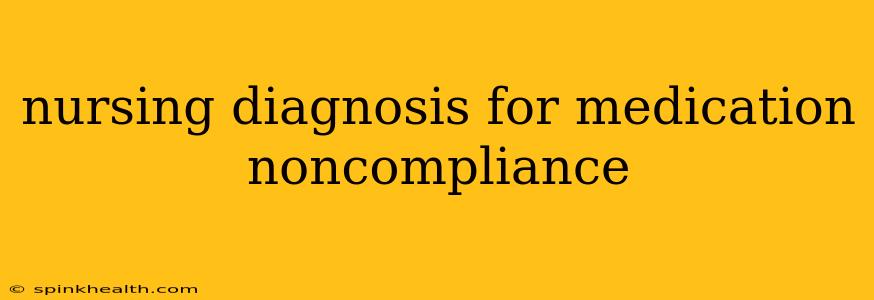Medication noncompliance, also known as nonadherence, is a significant challenge in healthcare. It impacts treatment outcomes, increases healthcare costs, and can even lead to serious health consequences. As a nurse, understanding the underlying reasons for noncompliance is crucial for effective intervention and improved patient care. This isn't just about ticking boxes on a chart; it's about building trust and understanding with your patients to help them achieve their health goals.
Let's explore the complexities of this issue and delve into the nursing diagnoses commonly associated with medication noncompliance. We'll unravel the reasoning behind these diagnoses and consider how you might approach each situation.
Understanding the Nuances of Noncompliance
Before diving into the diagnoses, it's vital to recognize that noncompliance isn't simply a patient failing to follow instructions. It’s often a complex interplay of factors. A patient might struggle with:
- Financial constraints: The cost of medication can be prohibitive, forcing difficult choices.
- Cognitive impairment: Understanding and remembering complex medication regimens can be challenging for some patients.
- Side effects: Unpleasant or severe side effects can lead patients to stop taking their medications.
- Lack of social support: Patients lacking a support system may find it harder to manage their medications.
- Cultural beliefs: Misconceptions or cultural beliefs surrounding medication can influence adherence.
- Lack of understanding: Patients might not fully understand why they need the medication or how it works.
Common Nursing Diagnoses for Medication Noncompliance
Several nursing diagnoses effectively capture the essence of medication noncompliance. Here are some of the most frequently used, along with a deeper look into each one:
1. Ineffective Health Maintenance
This diagnosis is frequently employed when a patient consistently fails to follow their prescribed medication regimen, leading to a decline in their overall health status. It acknowledges the patient's lack of engagement in activities necessary to maintain their health. This isn't about blaming the patient but recognizing a clear link between medication noncompliance and negative health outcomes.
Example: A patient with hypertension consistently forgets to take their blood pressure medication, resulting in uncontrolled blood pressure and increased risk of stroke.
2. Deficient Knowledge (regarding medication regimen)
This diagnosis highlights a gap in the patient's understanding of their medication. This could include the purpose of the medication, how to take it, potential side effects, and when to seek medical attention. Addressing this knowledge deficit is critical to fostering compliance.
Example: A newly diagnosed diabetic patient lacks understanding of insulin administration, dosage, and potential complications of non-compliance.
3. Noncompliance (with medication regimen)
This is a straightforward diagnosis that directly addresses the patient's failure to adhere to their medication plan. While often used, it's essential to go beyond this label and explore the underlying reasons for the noncompliance. This diagnosis should act as a springboard for further assessment and planning.
Example: A patient diagnosed with depression consistently misses doses of their antidepressant medication, impacting their mood and overall well-being.
4. Impaired Health Management
This diagnosis is broad but appropriate when a patient struggles to manage multiple aspects of their health, including their medication regimen. It might be used in cases where noncompliance is only one part of a larger picture of poor self-care.
Example: An elderly patient with multiple chronic conditions has difficulty managing their medications, diet, and exercise routines, all contributing to a decline in their overall health.
Addressing Medication Noncompliance: Moving Beyond the Diagnosis
The nursing diagnosis is just the beginning. Once you've identified the relevant diagnosis, you need to:
- Conduct a thorough assessment: Understand the patient's perspective, their reasons for noncompliance, and any barriers they face.
- Develop a collaborative care plan: Involve the patient in the decision-making process. The care plan should address the underlying causes of noncompliance.
- Educate the patient: Ensure the patient fully understands their medication, including its purpose, dosage, and potential side effects.
- Provide support and resources: Connect patients with resources to address financial, social, or cognitive barriers to compliance.
- Monitor and evaluate: Regularly assess the patient's adherence to the medication regimen and make adjustments to the care plan as needed.
Remember, building rapport and trust with your patients is paramount. Noncompliance often stems from factors beyond the patient's control. By demonstrating empathy, actively listening, and tailoring your approach to each patient’s individual circumstances, you can make a significant difference in improving medication adherence and ultimately, patient outcomes.

